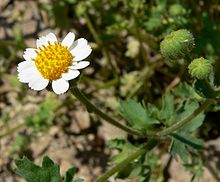Perityle is a genus of flowering plants in the daisy family.[2][3][4] They are known generally as rock daisies.[5]
| Perityle | |
|---|---|

| |
| Perityle emoryi | |
| Scientific classification | |
| Kingdom: | Plantae |
| Clade: | Tracheophytes |
| Clade: | Angiosperms |
| Clade: | Eudicots |
| Clade: | Asterids |
| Order: | Asterales |
| Family: | Asteraceae |
| Subfamily: | Asteroideae |
| Tribe: | Perityleae |
| Subtribe: | Peritylinae |
| Genus: | Perityle Benth. (1844) |
| Synonyms[1] | |
| |
Perityle is a variable genus, with its members sharing few characteristics. They include small herbs to spreading shrubs and most bear yellow or white daisylike flower heads. The fruit is generally a flat seed with thickened margins which may or may not have a pappus or scales. Plants of this genus are native to North and South America.[5]
A study including morphological and cytological analyses and a phylogenomic analysis of chloroplast and nuclear genomes was published in 2022, and concluded that Perityle as previously circumscribed was polyphyletic. The authors revived and/or expanded the genera Galinsogeopsis, Laphamia, and Nesothamnus to establish monophyletic clades. The small genus Amauria and the Desventuradas Islands endemic species Lycapsus tenuifolius were merged into Perityle, leaving it with 13 species.[6]
Species
edit13 species are currently accepted.[1][7]
- Perityle aurea Rose
- Perityle brandegeeana Rose
- Perityle californica Benth.
- Perityle carterae (A.M.Powell) Lichter-Marck
- Perityle congesta (M.E.Jones) Shinners
- Perityle crassifolia Brandegee
- Perityle cuneata Brandegee
- Perityle emoryi Torr.
- Perityle rosei Greenm.
- Perityle rotundifolia (Benth.) Brandegee
- Perityle socorrosensis Rose
- Perityle tenuifolius (Phil.) Lichter-Marck
- Perityle trichodonta S.F.Blake
Formerly placed here
edit- Laphamia fosteri (A.M.Powell) Lichter-Marck (as Perityle fosteri A.M.Powell)
- Laphamia inyoensis Ferris (as Perityle inyoensis (Ferris) A.M.Powell)
- Laphamia lindheimeri A.Gray (as Perityle lindheimeri (A.Gray) Shinners)
- Laphamia saxicola Eastw. (as Perityle saxicola (Eastw.) Shinners)
- Nesothamnus incanus (A.Gray) Rydb. (as Perityle incana A.Gray)
References
edit- ^ a b Perityle Benth. Plants of the World Online. Retrieved 22 June 2024.
- ^ Bentham, George. 1844. Botany of the Voyage of H.M.S. Sulphur 23 descriptions in Latin, commentary in English
- ^ Bentham, George. 1844. Botany of the Voyage of H.M.S. Sulphur 23 line drawing of Perityle californica
- ^ Tropicos, Perityle Benth.
- ^ a b Flora of North America Vol. 21 Page 317 Perityle Bentham
- ^ Isaac H. Lichter-Marck and Bruce G. Baldwin "A Phylogenetically Informed Reclassification of the Rock Daisies (Perityleae; Compositae)," Systematic Botany 47(3), 802-816, (16 September 2022). https://doi.org/10.1600/036364422X16573019348328
- ^ Flann, C (ed) 2009+ Global Compositae Checklist Archived 2014-11-15 at archive.today
External links
edit- Media related to Perityle at Wikimedia Commons
- Jepson Manual Treatment
- USDA Plants Profile